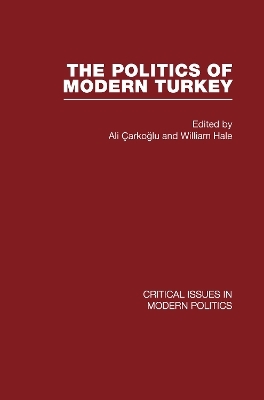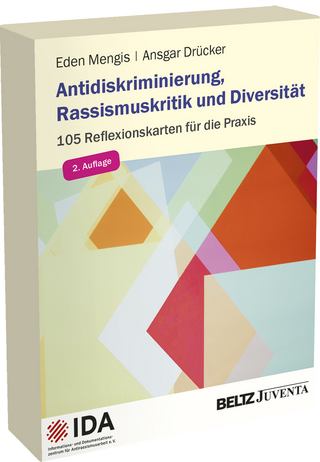
Politics of Modern Turkey
Routledge
978-0-415-41106-6 (ISBN)
- Titel z.Zt. nicht lieferbar
- Versandkostenfrei innerhalb Deutschlands
- Auch auf Rechnung
- Verfügbarkeit in der Filiale vor Ort prüfen
- Artikel merken
The Politics of Modern Turkey is a new four-volume Major Work from Routledge. The first volume of the collection (‘Historical Heritage of Politics in Modern Turkey’) brings together key research to provide a historical contextualization of modern Turkish political experience. This volume traces the sizeable literature that uses historical sociology as its basis to underline the continuities and breakdowns in key political areas of the transition from the Ottoman Empire to the modern Republican era, especially with reference to cultural, institutional, and elite politics perspectives covering the Ottoman and the single-party period (1923–50). The Tanzimat reforms as they relate to the Republican regime’s ground-breaking changes of the early 1930s are emphasized, as is the process of transition to a multi-party democracy after the Second World War. The volume also gathers a number of essays on the nature of ideological currents influential in contemporary Turkish politics, taking in Kemalist, Islamist conservative, and nationalist orientations, as well as Turkish versions of liberalism.
The second volume of the collection (‘Political Institutions and Processes’) presents the best research which depicts and evaluates constitutional changes, ending with recent amendments aimed at fulfilling the Copenhagen political criteria for EU membership. Volume II also includes vital material highlighting the character and functioning of the executive branch, the bureaucracy, and parliament. Seminal essays describing and analysing the 1960 and 1980 coups and the 1971 coup-by-memorandum, as well as the so-called ‘postmodern’ coup of 1997. Other topics covered include: the nature of public policymaking and the operation of patronage networks; the party system and electoral laws; social mobilization and trends in political participation; interest and pressure-group activity; and the political role of the military.
The material gathered in Volume III (‘Modern Turkey’s Foreign Policy’) addresses the historical development of foreign policymaking institutions, and the policymaking system. A historical section explores foreign policy under Kemal Atatürk and Ismet Inönü, through to the Cold War and post-Cold War periods. Regionally, the following areas are covered: Turkey’s broad geo-strategic situation; Turkish–American relations; Turkey and the European Union; Turkey’s relations with the Middle Eastern countries; Greek–Turkish relations and the Cyprus problem; and Turkey’s relations with the Soviet Union, the post-Soviet republics in Transcaucasia and central Asia, and Russia.
The final volume of the collection (‘Major Issues and Themes in Contemporary Turkish Politics’) is focused on a number of issues that have gained increasing salience over the last two decades. Topics include: democratization, and the politics of the EU membership process; identity issues, especially religiosity and the rising salience of pro-Islamist movements; ethnicity and the politics of the Kurdish minority; women in Turkish politics; political–economic interactions; and political performance and governance.
With an introduction newly written by the editor, which places the collected material in its historical and intellectual context, The Politics of Modern Turkey is an essential collection destined to be valued by scholars and students as a vital one-stop research and pedagogic resource.
Sabanci University, Istanbul, Turkey Bilkent University, Ankara, Turkey
Volume I: Historical Heritage of Politics in Modern Turkey Introduction Part 1: Historical Roots Part 2: Kemalism Part 3: Nationalism Part 4: Political Culture and Education Volume II: Political Institutions and Processes Part 5: Constitutional Framework Part 6: Executive Part 7: Bureaucracy Part 8: Parliament Part 9: Party System Part 10: Elections, Voting Part 11: Interest Group Politics, Civil Society Part 12: The Military Volume III: Modern Turkey’s Foreign Policy Part 13: Historical Background Part 14: Cyprus and Greek–Turkish Relations Part 15: Turkey’s Relations with the USA, Russia, and Eurasia Part 16: The Kurdish Question and Turkey’s Policy Towards the Middle East Part 17: Turkey and the EU Part 18: Foreign Policy Since 2002 Volume IV: Major Issues and Themes in Contemporary Turkish Politics Part 19: Democratization, Politics of the EU Membership Process Part 20: Identity Issues 1: Religiosity and the Rising Salience of Pro-Islamist Movements Part 21: Identity Issues 2: Ethnicity and the Politics of the Kurdish Minority Part 22: Identity Issues 3: Women in Turkish Politics Part 23: Policy-Making, Political Economic Interactions, Patronage
| Erscheint lt. Verlag | 1.4.2008 |
|---|---|
| Reihe/Serie | Critical Issues in Modern Politics |
| Verlagsort | London |
| Sprache | englisch |
| Maße | 156 x 234 mm |
| Gewicht | 3152 g |
| Themenwelt | Sozialwissenschaften ► Politik / Verwaltung |
| ISBN-10 | 0-415-41106-8 / 0415411068 |
| ISBN-13 | 978-0-415-41106-6 / 9780415411066 |
| Zustand | Neuware |
| Haben Sie eine Frage zum Produkt? |
aus dem Bereich

